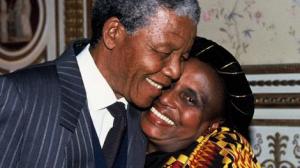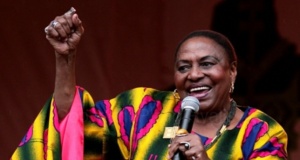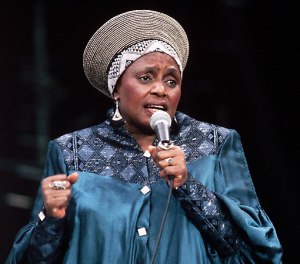 Legendary South African singer and activist Miriam Makeba (born 1932) rose to international fame during the 1960s, attracting a wide following through concert appearances and recordings. Although capable of great vocal versatility in a variety of languages and settings, including jazz and blues, Makeba became best-known for singing in her native dialect, distinguishable by explosive, clicking sounds formed with the epiglottis in the back of the throat.
Legendary South African singer and activist Miriam Makeba (born 1932) rose to international fame during the 1960s, attracting a wide following through concert appearances and recordings. Although capable of great vocal versatility in a variety of languages and settings, including jazz and blues, Makeba became best-known for singing in her native dialect, distinguishable by explosive, clicking sounds formed with the epiglottis in the back of the throat.
Forced into exile from her native country in 1960, Makeba used her stature to speak out against apartheid – the institutionalized practice of political, economic, and social oppression along racial lines. Such efforts earned her the title “Mama Africa,” as she became an enduring symbol in the fight for equality. In 1991, following the 1990 prison release of Nelson Mandela, Makeba triumphantly returned to South Africa, settling in the city of Johannesburg. Since then, she has served as a spiritual mother and inspiration to numerous South African musicians and remains committed to social change within the country. South Africa, despite the dissolution of the apartheid regime and the creation of a new democracy, continues to face racial tensions, economic hardships, a high rate of crime, and a rising AIDS epidemic, all of which count among Makeba’s primary concerns. In 1995, she founded her own charitable organization designed to help protect the women and young girls of her homeland.
“We have a beautiful country. We are a beautiful people. We are a forgiving people,” Makeba told Interview magazine in May of 2001. “We’ve had a past of being oppressed and maimed, but when we gained our independence in 1994, our president then, Nelson Mandela, and even our president now, Thabo Mbeki, told us yes, we went through this, but we must try to forgive. We may never forget and we must not forget – but we must forgive. So please, world – you out there in the world – forgive us.”
Raised within an Oppressive Society
Zensi Miriam Makeba, born on March 4, 1932, came into a world that offered few opportunities. The South African government, amid worldwide condemnation for its inhumanity, denied non-white citizens the most basic of human rights, including the right to vote and own land, as well as laws restricting where blacks could live, eat, work, or travel. Such a policy of white supremacy through racial segregation – which became official law in 1948 under Prime Minister Daniel Malan – prevailed for decades, regardless of the fact that blacks (or Africans) outnumbered whites in South Africa at a ratio of four-to-one.
Makeba’s father, a schoolteacher and member of the Xhosa tribe, could only choose between two places for his family to live: either a rural tribal reservation where the soil remained uncultivated or a regulated township near a city. He opted for the latter and, after securing government permission, moved to Prospect Township. Located near Johannesburg, Prospect, Makeba’s birthplace, was one of many segregated shantytowns surrounding the city. Typically, the cheaply-built homes on the crowded reservations had no electricity or running water, and children had little room outdoors to play. Africans were permitted to work in Johannesburg, where they arrived on designated buses each day, but the law required them to leave in the evenings by a certain time. In order to help make ends meet, Makeba’s mother, a Swazi, took a job as a domestic worker at a white household in Johannesburg. She supplemented her income by illegally selling home-brewed beer. Eventually, she was charged for the offense and spent six months in jail. Makeba, then just 18 days old, went with her.
Inclined to Sing
Because free public education ceased to exist for black children, when Makeba reached school age, she attended Kilnerton Training Institute, a Methodist school for African children in the South African administrative capital of Pretoria, located a short distance from Johannesburg. Here she received limited musical training through participation in the school choir, where her vocal talents were readily recognized, as well as the opportunity to perform in public. At the age of 13, Makeba gave her first solo performance before King George VI of England during his visit to South Africa.
Music had always played an important role in Makeba’s life. Early on, she listened to and picked up the traditional songs of the Xhosa and Zulu dialects. And beyond the music of her native people, characterized by clicks unknown in any other language, she discovered other music from listening to the radio and phonograph records. She particularly loved American jazz recordings, especially those of singer Ella Fitzgerald. “Anyone who sings,” Makeba once said, as quoted by Louise Crane in Ms. Africa: Profiles of Modern African Women, “makes music, as long as it’s good to my ear.”
Makeba spent eight years at Kilnerton, then took work with her mother performing servants’ chores in white homes. An early marriage around age 17 resulted in the birth of a daughter named Bongi, but her husband died when Makeba was just 19 years old. Thus, with a baby to support, she continued to work as a domestic and sang at weddings, funerals, and other events in her spare time. These amateur showings led to contact with a professional group of eleven men called the Black Manhattan Brothers, who asked Makeba to join as their female vocalist in 1954. She remained with the ensemble until 1957, during which time Makeba performed throughout South Africa, Rhodesia (now Zimbabwe), and the Belgian Congo (now Zaire), and in 1956 recorded her signature song, “Pata Pata,” which would eventually become a major American hit in 1967.
After breaking with the Black Manhattan Brothers, Makeba formed an all-female group called the Skylarks in 1958. The following year, she toured for 18 months with a musical extravaganza, African Jazz and Variety, and began performing solo engagements. These personal appearances, coupled with a series of popular recordings, established Makeba throughout her native land. Thereafter, Makeba further enhanced her reputation playing the female lead of Joyce, the owner of an illegal African drinking place called a “shebeen,” in the jazz opera King Kong. Based on the tragic account of an African prize fighter jailed for a crime of passion, the production, which premiered on February 2, 1959, toured South Africa for eight months with surprising success, despite the humiliating restrictions levied because of apartheid.
King Kong was forced to play before separate black and white audiences, and performances for Africans were usually given under difficult circumstances. For instance, special transportation arrangements for African audiences had to be made, shows for blacks were restricted to small halls with inadequate acoustics, and the production was banned altogether in all-white Pretoria. Nevertheless, in the legislative capital city of Cape Town, whites lined up at dawn to reserve seats to the always sold-out shows. In the end, audiences of both races fell in love with and cheered the voice of the young star, Miriam Makeba, who transformed songs first introduced in King Kong, such as “Back of the Moon,” into best-selling records.
International Fame
Prior to her role in King Kong, Makeba had already begun to attract international attention by playing the female lead and singing two songs in the 1958 film Come Back, Africa, an antiapartheid, semi-documentary produced and directed by independent American filmmaker Lionel Rogosin. Banned for obvious reasons in South Africa, the film was shot on location in Sofiatown, a reservation outside Johannesburg that was being demolished for a new, all-white suburb. Although Rogosin convinced authorities his intention was to simply document the ethnic music and folkways of African people, his real aim was to provide evidence to the world about the injustices of the South African government. Smuggled out of the country, Come Back, Africa debuted outside of competition at the 1959 Venice Film Festival and, when shown commercially thereafter, received critical praises for its dramatic impact.
Makeba, who had applied for a legal passport around 1957 to travel abroad, attended the Venice Film Festival. At the time married to Sonny Pillay, a ballad singer of Indian descent who Makeba both married and divorced in 1959, and concerned for her small child in South Africa, she initially intended to return home directly from Venice. But from the moment of her arrival, several American entertainers – namely Steve Allen – were so captivated by Makeba that they were determined to bring the young singer to the United States. Thus, from Venice, Makeba traveled first to London, England, where she met vocalist Harry Belafonte at a screening for Come Back, Africa. Judging her a revolutionary talent, he offered to act as Makeba’s chief sponsor and mentor.
 Next, she arrived in America for an appearance on Allen’s national television show. After the program, airing on November 30, 1959, Max Gordon, owner of New York City’s Village Vanguard nightclub, booked the singer for four weeks on the recommendation of Belafonte. The already accomplished performer coached Makeba on her stage poise and hired an arranger, clothing designer, and musicians in preparation for her club debut. On opening night, February 2, 1960, Makeba delighted the audience sprinkled heavily with other entertainers. “Alternating between sensuous and explosive styles,” according to a Look magazine review, “she interpreted both dialect tunes and jazz standards with a finesse that heralded the appearance of a new star.”
Next, she arrived in America for an appearance on Allen’s national television show. After the program, airing on November 30, 1959, Max Gordon, owner of New York City’s Village Vanguard nightclub, booked the singer for four weeks on the recommendation of Belafonte. The already accomplished performer coached Makeba on her stage poise and hired an arranger, clothing designer, and musicians in preparation for her club debut. On opening night, February 2, 1960, Makeba delighted the audience sprinkled heavily with other entertainers. “Alternating between sensuous and explosive styles,” according to a Look magazine review, “she interpreted both dialect tunes and jazz standards with a finesse that heralded the appearance of a new star.”
Throughout the early-1960s, she continued to draw enthusiastic crowds, embarking upon several national as well as international tours with Belafonte, who allowed Makeba to share the bill with him. The pair also collaborated on a record, winning a Grammy Award for An Evening with Belafonte/Makeba in 1965. Over the years, Belafonte and Makeba continued to reunite periodically, releasing in 1972 the album Miriam Makeba and Harry Belafonte. Makeba later made a special guest appearance for the Harry Belafonte Tribute at Madison Square Garden in 1997.
As a solo artist, Makeba recorded such popular albums as Miriam Makeba (1958) and The Voice of Africa (1964). Her eclectic repertoire included English ballads, Portuguese fados, Brazilian bossa novas, Hebrew and Yiddish melodies, Haitian chants, and other folk and popular styles from around the world. However, American audiences were most taken by the songs of Makeba’s native heritage, particularly “Qonqonthwane,” or “The Click Song,” a Xhosan wedding tune, and “Mbube,” also known as “Wimoweh,” a Zulu lion-hunting song.
Forced Into Exile
Fortunately, Makeba quickly achieved international stardom, for when she attempted to return to South Africa in 1960 to attend her mother’s funeral, she learned that the apartheid government had banned her from returning to the country. She also endured personal turmoil during the 1960s, including another failed marriage to trumpeter Hugh Masekela (the couple married in 1964 and divorced in 1966), as well as a serious threat to her health when she battled cervical cancer through radical surgery.
After South Africa revoked Makeba’s citizenship, she was initially reluctant to speak too much about her political views, fearing the safety of family members who remained near Johannesburg. But increasingly, she became more vocal. During an exile spanning over three decades, Makeba was issued passports from nine different countries and often referred to herself a “citizen of the world.” On two occasions, in 1964 and 1975, she addressed the General Assembly of the United Nations on the horrors of apartheid and in 1968 won the Dag Hammerskjold Peace Prize.
Also in 1968, Makeba married controversial black activist Stokely Carmichael (later known as Kwame Toure), a union that negatively impacted her career in America. Possibly fearing that Makeba’s earnings would aid Carmichael, promoters cancelled concerts, and RCA dropped Makeba from her record contract. Ultimately, Carmichael’s “black power” activism led to his exclusion from the mainstream in the U.S, and the couple fled to Guinea, West Africa. After their divorce in 1978, Makeba remained in Guinea for several years, continued to perform in Europe and parts of Africa, and served as Guinean ambassador to the United Nations. While an honorary citizen of Guinea, Makeba suffered another tragic loss when, in 1985, daughter Bongi died giving birth to a stillborn child.
According to Makeba, music and religious faith helped her overcome life’s misfortunes, and she remained an active and respected musician throughout her life. In 1975, Makeba recorded the acclaimed album A Promise, and during 1987 and 1988, she joined Paul Simon and South Africa’s Ladysmith Black Mambazo for the legendary Graceland world tour. Then, recording her first American set in two decades, she released a tribal collection entitled Sangoma in 1988, followed by an album of both traditional and standard compositions, Welela, in 1989. During the 1990s and beyond, her works included Eyes on Tomorrow, a commercial blend of jazz, blues, and pop released in 1991, and the Grammy-nominated Homeland, an album of both South African roots and American blues-pop released in 2000.
Makeba published her autobiography, Makeba: My Story, in 1987. It was subsequently translated and published in German, French, Dutch, Italian, Spanish, and Japanese, a testament to Makeba’s musical and social influence on people not only in South Africa and the U.S., but throughout the world. “I’m always in Europe, and in Africa there are may be five countries that I haven’t been to,” said Makeba in a Down Beat interview with Aaron Cohen. “When they say I’m in the ‘World’ category, I say, ‘Actually, I am a world category.”‘
Books
Almanac of Famous People, Gale Research, 1998.
Crane, Louise, Ms. Africa: Profiles of Modern African Women, J.B. Lippincott, 1973.
Contemporary Musicians, Volume 8, Gale Research, 1992.
Makeba, Miriam with James Hall, Makeba: My Story, New American Library, 1987.
Newsmakers, Issue 4, Gale Research, 1989.
Periodicals
Billboard, May 22, 1993; April 15, 2000.
Down Beat, April 2001.
Interview, May 2001. Jet, April 18, 1994.
Time, May 1, 2000.
UNESCO Courier, July 2000.
Source: http://www.answers.com/topic/miriam-makeba
Read more: http://www.answers.com/topic/miriam-makeba#ixzz2bwLRPGJ0
